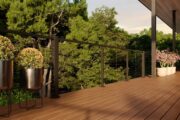(BPT) – Spring is a great time to re-side your house, whether to increase your home’s value or to replace damaged siding but be sure to evaluate all your siding options. Not all residential siding exteriors perform the same.
Weather attacks a home’s siding year-round with freeze-thaw cycles, sun, severe storms, wind and water. These elements, when combined with other threats from termites and household wear and tear, can leave any siding materials damaged.
Engineered wood strand lap siding offers the beauty of natural wood, with deep shadow lines for a premium cedar appearance. This siding has the durability of a treated engineered wood product to withstand harsh weather elements.
How do other popular siding products compare to engineered wood siding and trim? You’ll need to do your own research to decide, but here is some information to consider.
Fiber cement vs. engineered wood – freeze-thaw cycles from Denver to Boston
Fiber cement siding is typically more brittle than engineered wood, making it more susceptible to breaking or cracking such as from an errantly thrown ball.
Cracking may also occur when water penetrates and remains in the cement substrate and then freezes and expands as the outside temperature falls. Repeated cycles of freeze and thaw may enlarge the cracks.
In fact, freeze-thaw cycles can occur many times during the year. Following from the National Climatic Data Center are examples of U.S. cities and their average annual freeze-thaw cycles: Denver, 105; Minneapolis 58; Chicago, 56; St. Louis, 46; Washington, D.C., 76; Philadelphia, 52; New York, 39; Hartford, Conn., 75; and Boston, 47.
Vinyl vs. engineered wood
Although vinyl siding is popular in some parts of the country, it will fade over time to a different and unpredictable shade. It is difficult to refinish. Vinyl becomes more brittle in the winter in colder climates and as such is susceptible to cracking from impact against it. Even in warmer seasons, pliable vinyl siding is susceptible to damage from impact from stones thrown by a lawn mower or baseballs or from hail.
Homeowners may not know that because vinyl is affixed more loosely on the house to allow for contraction and expansion, a strong wind may cause the siding to chatter on the underlying structure and adjacent pieces of vinyl. Finally, because of its material properties, vinyl siding may be more challenging to dispose of responsibly.
Traditional wood vs. engineered wood
Traditional wood typically requires more maintenance, including painting and scraping, than other siding materials. It does not resist warping, cracking and splitting as well as other siding materials.
Engineered wood siding resists warping, cracking and splitting. It is typically factory pre-primed, enabling it to take and keep paint well, delivering optimal adhesion and consistent application. For all these reasons, treated engineered wood siding is a very good option compared to other types of siding.
One of the biggest names in treated engineered wood siding is also one of the fastest-growing brands of siding materials in America. During the past 17 years, builders and remodelers have used more than 7 billion square feet of LP SmartSide Trim and Siding.
‘LP Building Products has led the industry in developing a full portfolio of treated engineered wood siding products with the beautiful, authentic look of real wood and high resistance to damage from water and impact,’ says Jennifer Jenkins, LP SmartSide segment marketing manager.
‘LP SmartSide siding offers four components of termite and rot protection with a proprietary formula of binders, waxes, zinc borate and water-resistant overlay that work together to help the siding perform for decades, with long-lasting curb appeal. It also comes with an industry-leading 50-year limited warranty,’ Jenkins says. See the entire warranty at www.lpcorp.com.
To contact a preferred remodeler to get started on a home project, or to visualize a personalized exterior residential siding project, visit www.smartsidenow.com.

